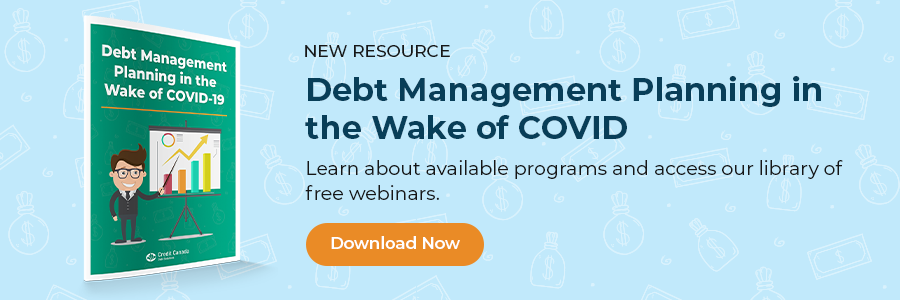
Recessions are an economic certainty. Unfortunately, it’s hard to be certain exactly when we’ll fall into one. Canada, like most countries, fell into a recession last year as drastic measures to slow the spread of COVID-19 were implemented across the country; economists made it official on May 1, 2020. So, are we still in a recession now — or is Canada headed for a recession? We answer these questions and more, plus discuss how you can prepare!
What Is a Recession?
A recession is a major decline in economic activity. It can last for mere months, or recovery can take several years. It can impact one country or many countries all at once. Economists declare a recession when a country experiences a negative gross domestic product, or GDP, which is the value of the goods and services produced within a certain period of time. During such difficult times, people lose their jobs, companies make fewer sales, and the country’s economic output generally declines.
Is Canada in a Recession (Still)?
Canada has not yet recuperated from the damage wrought by 2020, but it’s improving, led by an increase in household spending and the arrival of the new COVID vaccine, which is being interpreted by many as the light at the end of the proverbial tunnel.
Some experts have expressed concerns about the Canadian recession, stating that for a full recovery to be sustainable, the country needs to increase business investments, exports and productivity. RBC senior economist Josh Nye appears to agree with the gains and the need for further improvement , stating that there is "reason for the bank to be a bit more optimistic, but… they were sort of guarded in that optimism.”
7 Tips for Surviving a Recession
With the recession in Canada lingering, and another potential for recession always on the horizon, what can Canadians do to protect themselves? We’ve put together seven recession tips to help ensure you weather the storm.
1. Pay Down Your Debt
No one wants to be indebted to a creditor, especially if they fall on hard times. Plus, debt can quickly add up due to interest fees and late fees. Although some banks made concessions during COVID because of the extreme and global nature of the pandemic, they may not be as forgiving when it’s just a “normal” recession in Canada.
So, start paying down those debts if you have some extra money! Wondering which method of payment will bring debt relief the quickest? Check out our free Debt Calculator.
2. Increase Your Emergency Savings
Along with paying down debt, you should also try to put extra money into your emergency savings fund. That way, if the recession does strike back or a layoff happens, you can turn to your savings instead of credit cards.
One important thing to remember: emergency savings are for emergencies only. Your rainy day fund is for things like a new pair of shoes or a Saturday getaway.
3. Plan Ways to Cut Back
Wondering how to pay down debt and increase your emergency savings with no financial windfall on the horizon? Start cutting back on everyday expenses. You can do that by tracking your spending; after all, until you know where you’re being wasteful, you won’t be able to stop wasting!
Cutting back could mean anything from skipping morning lattes to packing a lunch, cutting back on phone plans, or even cutting cable altogether. Our Budget Calculator shows you how the little things can quickly add up!
4. Start Budgeting
This goes hand-in-hand with tracking your expenses. Now, you may think budgeting is just a way to cramp your way of living; but that’s not true! It’s also a way to begin setting aside money for paying down debt, setting up an emergency fund, and for planning the fun things in life too!
To help you get started, we’ve come up with some budgeting tips for struggling families, a list of the best user-friendly budgeting apps, and of course our free Budget Planner + Expense Tracker, which is the ultimate one-two financial planning punch! Download it today to get started, the instructions are all included!
5. Build Up Your Skills
It helps to have more than one skill. Now, we’re not saying you need to be a “Jack of all trades, and a master of none.” You may be an expert at what you do, and have no intention of doing anything else. However, it doesn’t hurt to pick up some additional skills to improve your odds of picking up another job following a layoff, until you can get back to your old type of work.
For example, if you’re a graphic designer by day but love woodworking on the weekend, you may want to hone that skill and create an online portfolio of your woodwork. Or, if you have the time, you might want to take a certificate course in another line of work that you can use as a backup. Check out some of these short Canada certificate courses.
6. Improve Your Credit Score
During a recession, if you’re in debt and lacking savings, you may think you need to take out a loan or apply for some credit to get by. Unfortunately, that’s very hard to do without a good credit score (even if you can find a bank that will offer you a loan or credit with a poor score, it’ll likely come with very steep interest). Plus, you never want to rely on credit to make financial ends meet.
However, boosting your credit score is never a bad idea, it can open up better options for you in the future, like getting a rental apartment you want, getting a business loan at a great rate, or qualifying for a mortgage. Read up on how to get started on improving your credit score here. Prefer a webinar? Check out Credit Scores 101.
7. Look at Your Investments
Stock markets can plunge during a recession, putting people into a state of panic. To prepare for a recession, investors should take the time to review their allocation of assets to be sure their portfolio is balanced and diversified.
It’s also worth considering your risk tolerance for market fluctuations. John Bogle, the founder of Vanguard, once said, "If you have trouble imagining a 20% loss in the stock market, you shouldn't be in stocks." So, make sure you’re only investing an amount that you’re comfortable with potentially losing, so you don’t also lose sleep!
Of course, we’re experts in debt reduction and credit building, not investing, so you should always consult with your financial advisor before making any investment decisions.
Credit Canada is Here for You – Recession or Not!
It can be hard to know what to do during a recession, and it can be scary not knowing how to pay the bills, or even putting food on the table. But the good news is, Canada’s recession history shows us that we will get through it! And, Credit Canada is here for you too, whether you’re already struggling or you want to prepare for the future.
You can contact our caring, certified Credit Counsellors at 1.800.267.2272 for a free, non-judgmental and confidential phone appointment, or book a free Debt Assessment online. All of our counselling and free, and there's no obligation. We're here to help.

Frequently Asked Questions
Have a question? We are here to help.
What is a Debt Consolidation Program?
A Debt Consolidation Program (DCP) is an arrangement made between your creditors and a non-profit credit counselling agency. Working with a reputable, non-profit credit counselling agency means a certified Credit Counsellor will negotiate with your creditors on your behalf to drop the interest on your unsecured debts, while also rounding up all your unsecured debts into a single, lower monthly payment. In Canada’s provinces, such as Ontario, these debt payment programs lead to faster debt relief!
Can I enter a Debt Consolidation Program with bad credit?
Yes, you can sign up for a DCP even if you have bad credit. Your credit score will not impact your ability to get debt help through a DCP. Bad credit can, however, impact your ability to get a debt consolidation loan.
Do I have to give up my credit cards in a Debt Consolidation Program?
Will Debt Consolidation hurt my credit score?
Most people entering a DCP already have a low credit score. While a DCP could lower your credit score at first, in the long run, if you keep up with the program and make your monthly payments on time as agreed, your credit score will eventually improve.
Can you get out of a Debt Consolidation Program?
Anyone who signs up for a DCP must sign an agreement; however, it's completely voluntary and any time a client wants to leave the Program they can. Once a client has left the Program, they will have to deal with their creditors and collectors directly, and if their Counsellor negotiated interest relief and lower monthly payments, in most cases, these would no longer be an option for the client.







